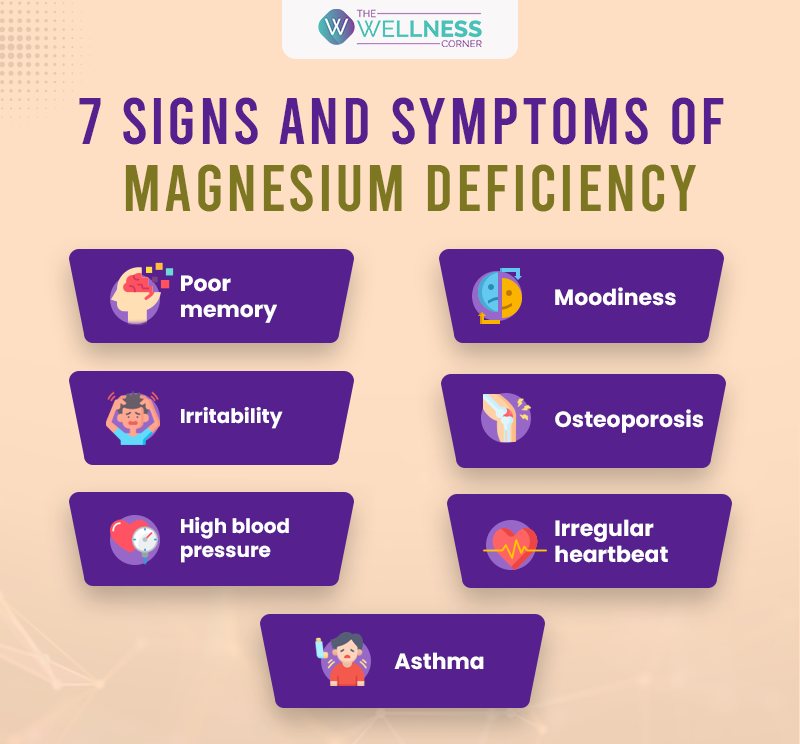7 Signs And Symptoms Of Magnesium Deficiency
6 hours ago
5 minute read.

Magnesium is one of the most important minerals in your body, and it's involved in over 300 enzymatic reactions that are crucial to your health and well-being. Unfortunately, many people don't get enough Magnesium in their diet, which can lead to hypomagnesemia and various health issues, including muscle cramps, constipation, and even heart problems in more severe cases.
Fortunately, you can recognize the signs and symptoms of magnesium deficiency so you can take the appropriate steps to restore your magnesium levels or prevent further problems from occurring in the first place. In this article, we'll look at seven signs and symptoms of magnesium deficiency and how it affects your health.
Causes of magnesium deficiency
Magnesium deficiency is a common nutrient deficiency. The average person does not consume enough Magnesium from their diet, even though it is found in many foods, including dark leafy greens, nuts, seeds, beans, whole grains, and chocolate. Low levels of Magnesium can lead to increased anxiety, poor sleep quality, low energy levels, and muscle cramps. The causes of magnesium deficiency vary and can include
- Starvation
- Certain medications, such as chemotherapy drugs and proton pump inhibitors
- Alcoholism, especially long-term alcoholism.
- Magnesium deficiency is also common in chronic kidney disease patients.
- Kidney dysfunction hampers magnesium absorption from food sources and interferes with its production in your cells. The result is a shortage of Magnesium circulating through your bloodstream, which can trigger symptoms.
A simple blood test can determine your optimal intake of Magnesium. If you have insomnia, anxiety, or unexplained headaches, speak with your doctor about getting tested for this nutrient deficiency.
[ Melatonin Vs. Magnesium: Which One Is Better? ]
Signs and symptoms

The signs and symptoms of magnesium deficiency can be vague, so it's important to test for a deficiency if you experience any. Below are seven common signs that may indicate magnesium depletion:
1) Poor memory
A magnesium deficiency can lead to various symptoms, including poor memory or difficulty concentrating. The optimal intake of Magnesium is 350-400 mg per day. The only way to know if you are deficient in this mineral is by testing it via blood serum or urine analysis. Nutrient deficiencies are usually caused by diets low in vitamins and minerals and diseases such as Crohn's disease that prevent the body from absorbing nutrients properly.
2) Moodiness
Moodiness is one of the most common symptoms people experience when they are deficient in Magnesium. Various things can cause this symptom, but it is usually linked to an overall nutrient or vitamin deficiency. Some other signs that you may be low on Magnesium include fatigue, heart palpitations, and muscle cramps. You can test your levels by drinking a health drink that contains Magnesium for 3-4 days before retaking the test.
Track your mood on THE WELLNESS CORNER APP, select what you resonate with or simply describe your feelings and it will recommend related resources that you can benefit from.
3) Irritability
Some of the most common symptoms of magnesium deficiency are irritability, depression, muscle cramps, and chronic fatigue. You may be experiencing these symptoms if you have a vitamin deficiency or other underlying medical condition. If your doctor has ruled out all other possible causes, then it is likely that you are deficient in Magnesium. Talk to your doctor about getting a magnesium test done by your local lab to find out for sure.
4) Osteoporosis
A magnesium deficiency can lead to an increased risk for osteoporosis, one of the most common bone diseases. The International Osteoporosis Foundation recommends a magnesium test for anyone over the age of 50 or anyone who has been on long-term medication that causes chronic diarrhea. A magnesium deficiency can also cause muscle cramps, headaches, fatigue, mental disorders like depression or irritability, and even kidney stones.
[Are You At Risk Of Osteoporosis? - The Wellness Corner Free Risk Assessment]
5) High blood pressure
The first sign of a magnesium deficiency is high blood pressure. When there is not enough Magnesium in the body, the parathyroid gland will secrete more PTH hormone to ensure that the calcium levels are up to normal. This causes an increase in blood pressure. If you are experiencing this sign, it is suggested that you get your blood pressure checked by a doctor so they can assess whether or not it's related to your magnesium deficiency.
6) Asthma
Magnesium is an essential mineral that plays a significant role in heart health, muscle function, mood regulation, sleep quality, and more. It also helps regulate the body's inflammatory response, which is important for people with asthma. When someone has asthma, their airways can become inflamed due to allergies or exercise. The inflammation causes the airways to swell up and makes it difficult for them to breathe.
7) Irregular heartbeat
If you notice an irregular heartbeat while resting, it could signify that you're Magnesium deficient. Some other symptoms include tremors or spasms, seizures, and a tingling sensation in the extremities. Some health experts have also speculated that magnesium deficiency may be associated with some mental disorders, such as schizophrenia. It's important to note that not all signs and symptoms can be easily explained by magnesium deficiency.
Optimal intake & how to reap it naturally
The optimal intake for Magnesium Deficiency is between 350-400 milligrams per day. You can reap the mineral naturally from banana, tofu, yogurt, peanuts, salmon, leafy greens, nuts, seeds, beans, whole grains, and many other foods. Adding a dash of apple cider vinegar or lemon juice will also help your body absorb more Magnesium by allowing for increased bioavailability.
|
Required Dietary allowance of MAGNESIUM (mg/d) for Indians (ICMR, 2020) |
||||
|
Age (yr) |
Male |
Female |
||
|
General |
Pregnancy |
Lactation |
||
|
50+ |
385 |
325 |
||
|
30-50 |
385 |
325 |
||
|
18-30 |
||||
|
16-18 |
405 |
335 |
||
|
13-15 |
355 |
325 |
||
|
10-12 |
270 |
255 |
||
|
7-9 |
215 |
|||
|
4-6 |
155 |
|||
|
1-3 |
135 |
|||
|
6-12m |
75 |
|||
|
0-6m |
30 |
|||
Conclusion
Magnesium deficiency can be caused by many things, including alcoholism, certain medications, eating disorders, Crohn's disease, or Celiac disease. It is important to know the signs and symptoms so that you can treat this deficiency as soon as possible. Clear skin, smooth hair, healthy nails, and teeth are all telltale signs of adequate amount of magnesium in your body. But, if you are experiencing the opposite symptoms in addition to other health issues, then it is a good idea to talk with your doctor about regular magnesium supplements.
Consult a doctor online on The Wellness Corner for medical advice and treatment evaluation.
Leave a Comment
Related Articles
Health Checks @ Home
Service
Explore
© 2025 Truworth Health Technologies Pvt. Ltd.






